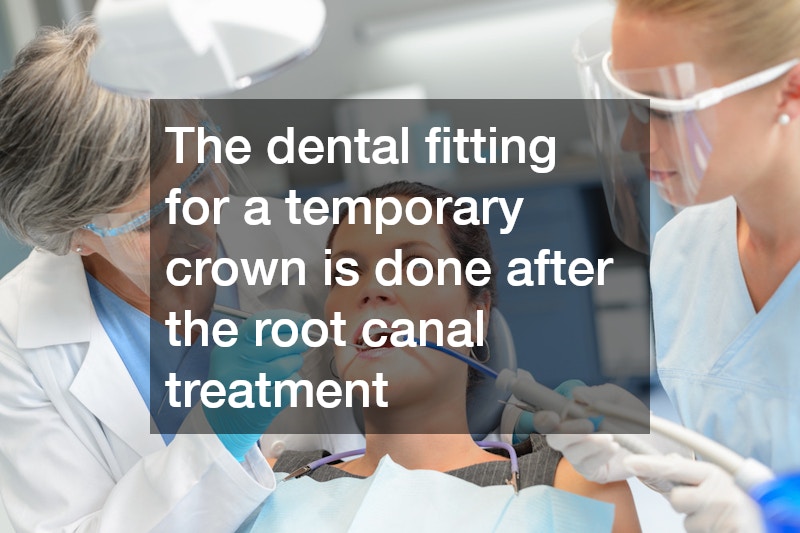
After a root canal, you may need a temporary root canal crown to protect your tooth while it heals. The healing process after a root canal can take some time, and during this period, it’s important to understand the role of the temporary crown. One of the common questions is, how long does a temporary crown last after root canal? Typically, it lasts about two to three weeks, but this can vary depending on your specific case and how well you care for it.

The dental fitting for a temporary crown is done after the root canal treatment to ensure your tooth is safeguarded from damage or infection during root canal healing. While the temporary crown isn’t as strong as a permanent one, it’s designed to provide adequate protection for the short term.

Once your tooth has fully healed, your dentist will replace the temporary crown with a permanent one, such as a dental crown. These permanent dental crowns are much more durable and custom-made to fit your tooth perfectly. It’s essential to follow your dentist’s instructions during the healing phase and be careful with the temporary crown, avoiding sticky or hard foods until your permanent crown is in place. Call your dental surgeon today to schedule your appointment.
If you need a root canal, you are not alone. The American Association of Endodontists estimates that about 15 million root canals are done every year. You probably have a lot of questions about your root canal treatment.
Are you put to sleep during a root canal? Most people are not. Novocaine is usually all that is needed to numb you before the surgery. However, if you suffer from dental phobia, then sedation dentistry may be your only option. Then, you are put to sleep with anesthesia.
How much bleeding during root canal procedure is normal? If you are awake during the procedure, you will see many splatters of blood. This is normal. It is also normal for there to be some bleeding up to two days after your root canal.
What is the best medicine for root canal pain? Most dentists do not prescribe any pain medicine for a root canal. Using over-the-counter pain medicines like ibuprofen or naproxen is usually all it takes.
Are artificial nerves root canal procedures possible? Although scientists have successfully made artificial nerves in the lab, these are hoped to be used for people with prosthetic limbs. So far, there are no plans to place artificial nerves in the mouth. Root canals do remove your tooth’s nerves. You do not need the nerves for your tooth to do its job well.
More than half of the adult U.S. population surveyed over age 50 agree that a smile is the one physical feature that stays the most attractive as we age, according to a survey by the American Academy of Cosmetic Dentistry. But in order to achieve and maintain your smile, you need to make frequent trips to the dentist for cleanings and evaluations. Otherwise, you may be ashamed to show your smile in photos, like the 18% of people who say they usually conceal their teeth in photos. And even though root canals are a fairly common procedure in the family dentistry field, there are many people who don’t know what to expect. Here are some answers to common questions about getting a root canal.

-
- “Is a root canal painful?”
While many people think of root canals as painful, dental technology has made strides in reducing the amount of pain felt during one. Aae.org says, With modern techniques and anesthetics, the vast majority of patients report that they are comfortable during the procedure. For the first few days after treatment, your tooth may feel sensitive, especially if there was pain or infection before the procedure…In some cases prescription medications may be necessary, and are available from your endodontist. Follow your endodontist’s instructions carefully.”
- “Is a root canal painful?”
-
- “When do I know if I need a root canal?”
There are many telltale signs that you may need a root canal, including extreme sensitivity to hot and cold foods, numbness or discomfort, difficulty chewing or biting, and severe pain in the area. Your dentist may also be the first to notice the issue and diagnose a need for a root canal procedure. It’s also important to note that not cases that require root canals experience any of these symptoms; it can be a pain free as well.
- “When do I know if I need a root canal?”
- “Why don’t I just get the tooth removed?”
Most of the time, a full extraction is not necessary, and the biggest benefit of a root canal is being able to keep the affected tooth instead of having to permanently lose it.
Ultimately, there are many benefits of root canals, and most family dental professionals highly recommend them as an alternative to a full removal. For more information, contact Hudson Family Dental.


